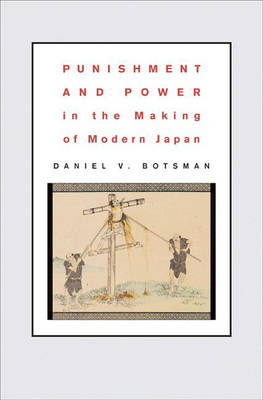
Punishment and Power in the Making of Modern Japan
Princeton University Press (Verlag)
978-0-691-11491-0 (ISBN)
- Titel ist leider vergriffen;
keine Neuauflage - Artikel merken
The kinds of punishment used in a society have long been considered an important criterion in judging whether a society is civilized or barbaric, advanced or backward, modern or premodern. Focusing on Japan, and the dramatic revolution in punishments that occurred after the Meiji Restoration, Daniel Botsman asks how such distinctions have affected our understanding of the past and contributed, in turn, to the proliferation of new kinds of barbarity in the modern world. While there is no denying the ferocity of many of the penal practices in use during the Tokugawa period (1600-1868), this book begins by showing that these formed part of a sophisticated system of order that did have its limits. Botsman then demonstrates that although significant innovations occurred later in the period, they did not fit smoothly into the "modernization" process. Instead, he argues, the Western powers forced a break with the past by using the specter of Oriental barbarism to justify their own aggressive expansion into East Asia. The ensuing changes were not simply imposed from outside, however.
The Meiji regime soon realized that the modern prison could serve not only as a symbol of Japan's international progress but also as a powerful domestic tool. The first English-language study of the history of punishment in Japan, the book concludes by examining how modern ideas about progress and civilization shaped penal practices in Japan's own colonial empire.
Daniel V. Botsman is Associate Professor of History at the University of North Carolina at Chapel Hill. He has lived in Japan for several years and also taught in the Faculty of Law at Hokkaido University.
List of Illustrations ix Acknowledgments xi Abbreviations xv INTRODUCTION 1 CHAPTER 1: Signs of Order: Punishment and Power in the Shogun's Capital 14 CHAPTER 2: Bloody Benevolence: Punishment, Ideology, and Outcasts 41 CHAPTER 3: The Power of Status: Kodenmacho Jailhouse and the Structures of Tokugawa Society 59 CHAPTER 4: Discourse, Dynamism, and Disorder: The Historical Significance of the Edo Stockade for Laborers 85 CHAPTER 5: Punishment and the Politics of Civilization in Bakumatsu Japan 115 CHAPTER 6: Restoration and Reform: The Birth of the Prison in Japan 141 CHAPTER 7: Punishment and Prisons in the Era of Enlightenment 165 CONCLUSION: Punishment, Empire, and History in the Making of Modern Japan 201 Notes 231 Bibliography 281 Index 303
| Erscheint lt. Verlag | 26.12.2004 |
|---|---|
| Zusatzinfo | 2 Maps |
| Verlagsort | New Jersey |
| Sprache | englisch |
| Maße | 152 x 235 mm |
| Gewicht | 595 g |
| Themenwelt | Sachbuch/Ratgeber ► Geschichte / Politik ► Allgemeines / Lexika |
| Geisteswissenschaften ► Geschichte | |
| Recht / Steuern ► Strafrecht ► Kriminologie | |
| ISBN-10 | 0-691-11491-9 / 0691114919 |
| ISBN-13 | 978-0-691-11491-0 / 9780691114910 |
| Zustand | Neuware |
| Haben Sie eine Frage zum Produkt? |
aus dem Bereich


